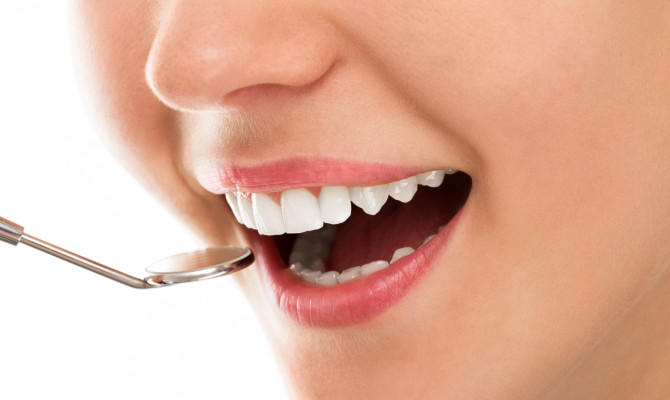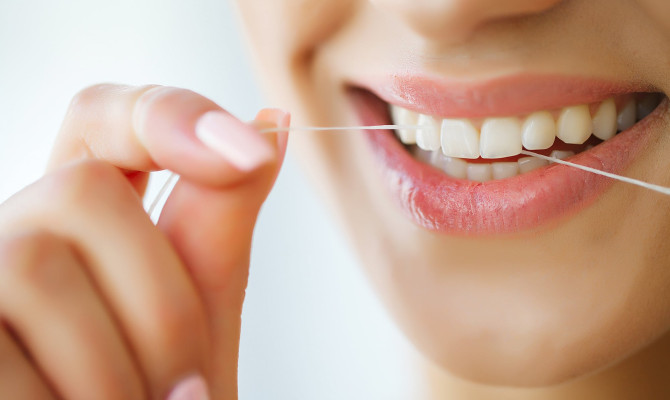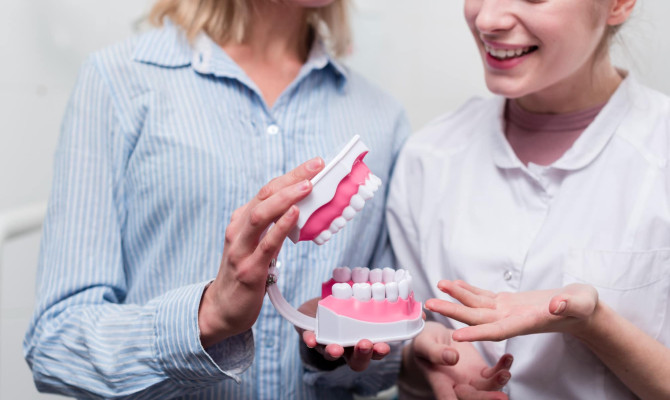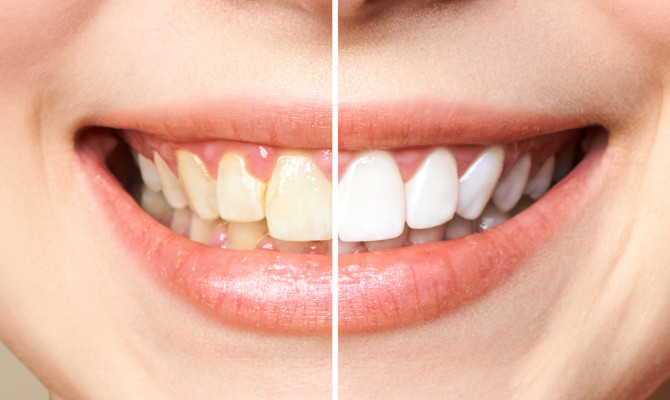The Importance of Regular Teeth Cleaning for Maintaining Oral Health

- Cleaning
- 16 Aug 2023
Overview
What is teeth cleaning?
A dentist or dental hygienist performs a dental operation called teeth cleaning, also known as dental scaling, to remove plaque and tartar buildup from the teeth.
Cleaning your teeth is especially necessary if you have periodontitis, a severe gum disease. Scaling is a crucial component of maintaining good dental health.1Overview | Researched based study from Nlm.nih.gov

Tartar
What exactly is tartar?
When plaque, a bacterial film that sticks to the teeth, is not eliminated by brushing and flossing, tartar, a complex, yellowish deposit, develops on the teeth. If left untreated, it can result in gum disease, tooth decay, and other oral health problems.1Tartar| Researched based study from Nlm.nih.gov
Need
When should you have your teeth cleaned?
Some signs include
- Visible tartar accumulation is incredibly close to the gum line.
- Bad breath that is resistant to mouthwash or brushing.
- Gums that are swollen or bleeding.
- Tooth pain or sensitivity.
- Gum-line recession.
- Tooth decay.
- Routine procedure
If you notice any of these symptoms, it’s crucial to make an appointment with a dentist or dental hygienist for a checkup. They are able to evaluate the health of your teeth and gums and, if necessary, suggest scaling.1Need | Researched based study from Nlm.nih.gov
The Procedure
How exactly is the teeth-cleaning treatment done?
A dentist or dental hygienist typically scales teeth in a dental office. The general stages are as follows:
Examination
- To assess the level of tartar, staining, and plaque accumulation, your gums, and teeth will be checked.
Scaling
- Specialized instruments will remove plaque from the teeth and gum line. They could use hand tools and ultrasonic scalers to get rid of the buildup.
Polishing
- The teeth will be polished with a specialized paste once the cleaning is finished to remove any last-minute stains and smooth the tooth surface.
Fluoride therapy
- A fluoride treatment may occasionally be used to strengthen the teeth and stop decay.2The procedure| Researched based study from Nlm.nih.gov
Types
What are the various methods for cleaning teeth?
Preventive cleaning
- This is a routine procedure to maintain optimal dental health, usually performed every six months.
Scaling and root planing
- Deep cleaning procedures like this are frequently used to treat gum disease. To stop germs from continuing to accumulate on the roots, rough patches on the roots are smoothed down.2Methods | Researched based study from Nlm.nih.gov
Gross debridement
- If there is a significant tartar accumulation, this preliminary cleaning process can be required.
Routine periodontal care
- This is done following a thorough cleaning or periodontal therapy to keep the gums healthy.2Methods | Researched based study from Nlm.nih.gov
Will the teeth clean cause me any pain?
- Although the process is often painless, you can feel sensitivity or discomfort. High-speed vibrations caused by the ultrasonic scaler used on your teeth, particularly around the gum lines, might be uncomfortable, although this is usually controlled and considered normal.
- If there are a lot of buildups, the cleaning procedure could take longer and require several visits.1Methods | Researched based study from Nlm.nih.gov
Frequency
How frequently should I see the dentist to have my teeth cleaned?
- The dentist visit and cleaning should typically be arranged every six months. However, the number of dental visits you need might change based on your unique oral health requirements and risk factors.
- For instance, if you’ve had gum disease in the past, you might need to see the dentist more regularly, like every three to four months, to stop the condition from worsening.1Frequency | Researched based study from Nlm.nih.gov
- Similarly, to this, you can require more dental appointments if you have a high risk of acquiring tooth decay.1Frequency | Researched based study from Nlm.nih.gov
Causes
Causes of tartar
Poor oral hygiene
- Lack of regular brushing and flossing can cause plaque to accumulate and eventually harden into tartar.
Diet
- Consuming a diet heavy in starchy or sugary foods might boost tartar buildup production.
Dry mouth
- Lack of saliva caused by some drugs or medical conditions might raise the risk since saliva helps to neutralize the acids generated by bacteria in the mouth.3Causes| Researched based study from Cdc.gov
Age
- Our gums gradually recede with age, which makes it simpler for tartar to build up along the gum line.
Smoking
- Smoking can decrease saliva flow and promote bacterial proliferation in the mouth, which increases accumulation.
Genetics
- Some people could be more susceptible owing to hereditary causes.3Causes| Researched based study from Cdc.gov
Benefits
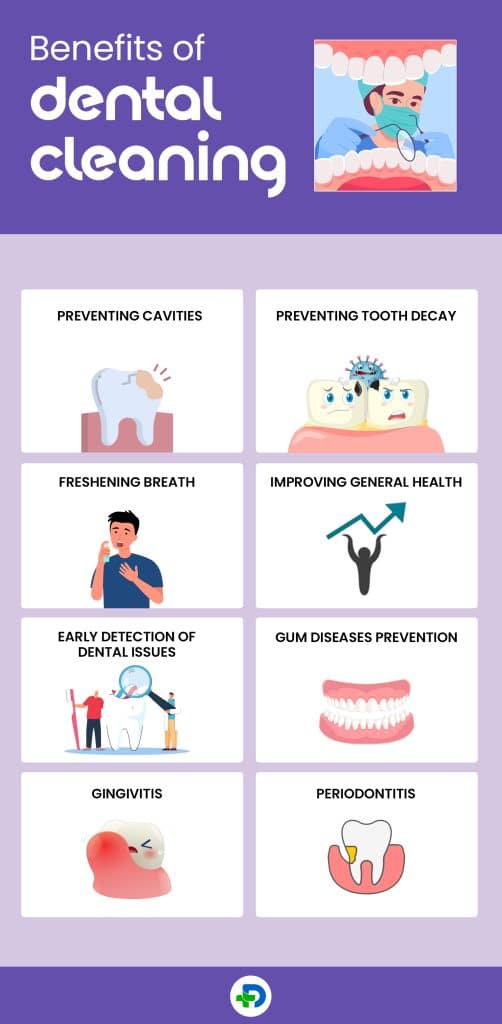
Benefits of dental cleaning
Preventing cavities
- Plaque and tartar are removed from the teeth during routine dental cleanings, which can help stop cavities and tooth decay.
Preventing tooth decay
- If neglected, tartar accumulation can cause gum irritation, infection, and gum disease. Gum disorders can be avoided with routine cleaning.
Freshening breath
- Scaling can help with bad breath, which the accumulation may contribute to.4Benefits| Researched based study from Nlm.nih.gov
Improving general health
- There has been increasing research linking gum disease to heart disease and stroke. You may be enhancing your general health by preventing gum disease.7Benefits| Researched based study from Health.harvard.edu
Early detection of dental issues
- During the appointment, your dentist will also examine your teeth and gums to search for any signs of dental problems. Early detection and solution of these issues are possible to prevent further development.4Benefits| Researched based study from Nlm.nih.gov
Gum diseases prevention
Gum disease, also known as periodontal disease, is a common condition that affects the tissues supporting the teeth and the gums.
Gingivitis
- Only the gums are impacted by this early stage of the illness. Symptoms include red, swollen, and bleeding gums.
Periodontitis
The infection has spread to the teeth surrounding bones and supporting tissues in this more advanced stage. Symptoms consist of
- Receding gums
- Loose teeth
- Changes in the bite.6Benefits| Researched based study from Nlm.nih.gov
Consequences
What to expect following a dental cleaning procedure?
Soreness
- Particularly if you have a deep cleaning, your gums and teeth can feel sore for a few days following the cleaning. This is typical and will pass in a few days.
Sensitivity
- You could be sensitive to pressure on the teeth and hot or cold conditions. This is normal and will subside in a few days.
Bleeding
- If your gums were irritated, you might have seen some slight bleeding. Within a day or two, this should end.
Cleaner teeth
- After the cleaning, the cleanliness and brilliance of your teeth should noticeably improve.4Consequences| Researched based study from Nlm.nih.gov
Suggestions
How do you keep your mouth healthy?
Brush twice a day
- Use fluoride-containing toothpaste twice daily to brush your teeth for at least two minutes every time.
- Brush your teeth on all surfaces, including the gum line and backs of your teeth, with a soft-bristled toothbrush.
Floss every day
- Plaque and food fragments stuck between your teeth, where your toothbrush can’t get to them, may be removed with flossing.
- Apply a gentle back-and-forth motion to the floss as you move it between your teeth and down the gum line.
Use a mouthwash
- Mouthwash can aid in bacterial removal and breath freshening.
- Pick a fluoride-containing mouthwash without alcohol.
Eat less sweet and acidic meals
- Acidic and sugary diets can speed up erosion and deterioration. Your intake should be kept to a minimum, or you can rinse your mouth with water after.5Suggestions| Researched based study from Cdc.gov
Any feedback on this article?
 This Articles content was accurate
This Articles content was accurate Very Informative Article
Very Informative Article I have a question or a comment
I have a question or a comment
 This article contains inaccurate content
This article contains inaccurate content This article was not helpful
This article was not helpful I have a question or a comment
I have a question or a comment
We appreciate your helpful feedback!
Checkout our social pages
References
-
National Library of Medicine
Routine scale and polish for periodontal health in adults | Overview | Tartar | Need | Frequency
-
National Library of Medicine
Oral Hygiene Practices and Teeth Cleaning Techniques Among Medical Students | Procedure | Types
-
Centers for Disease Control and Prevention
Oral Health Conditions | Risk factors
-
National Library of Medicine
Gingivitis and periodontitis: What are the advantages and disadvantages of professional teeth-cleaning? | Benefits | Consequences
-
Centers for Disease Control and Prevention
What Can Adults Do to Maintain Good Oral Health? | Suggestions
-
National Library of Medicine
Periodontal Disease | Benefits
-
Harvard Health Publishing
Gum disease and heart disease: The common thread | Benefits













